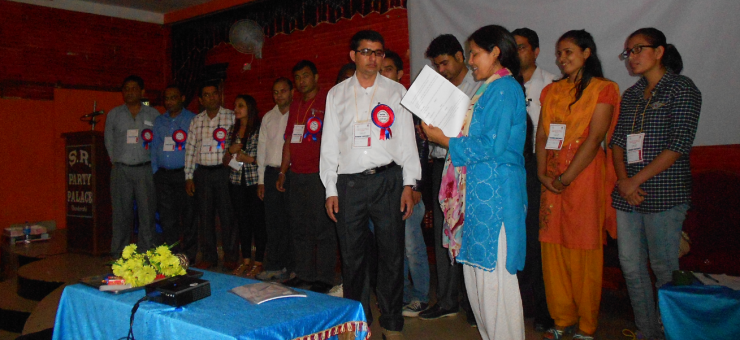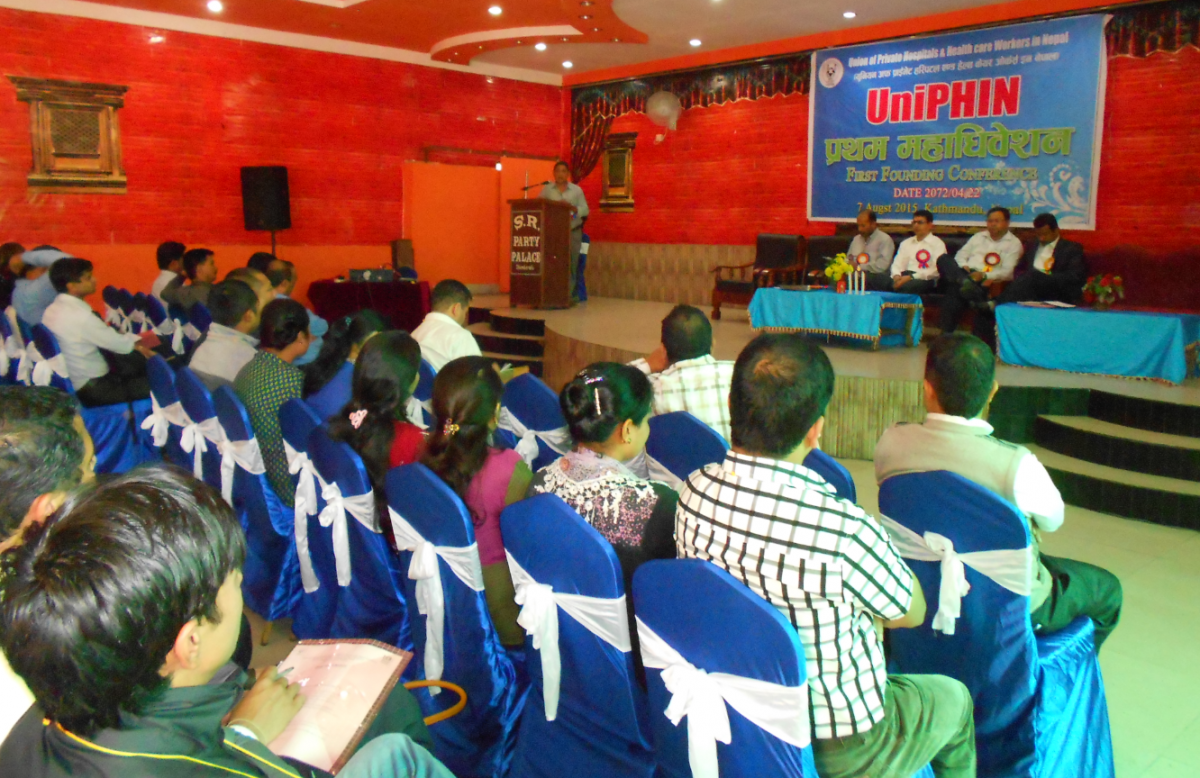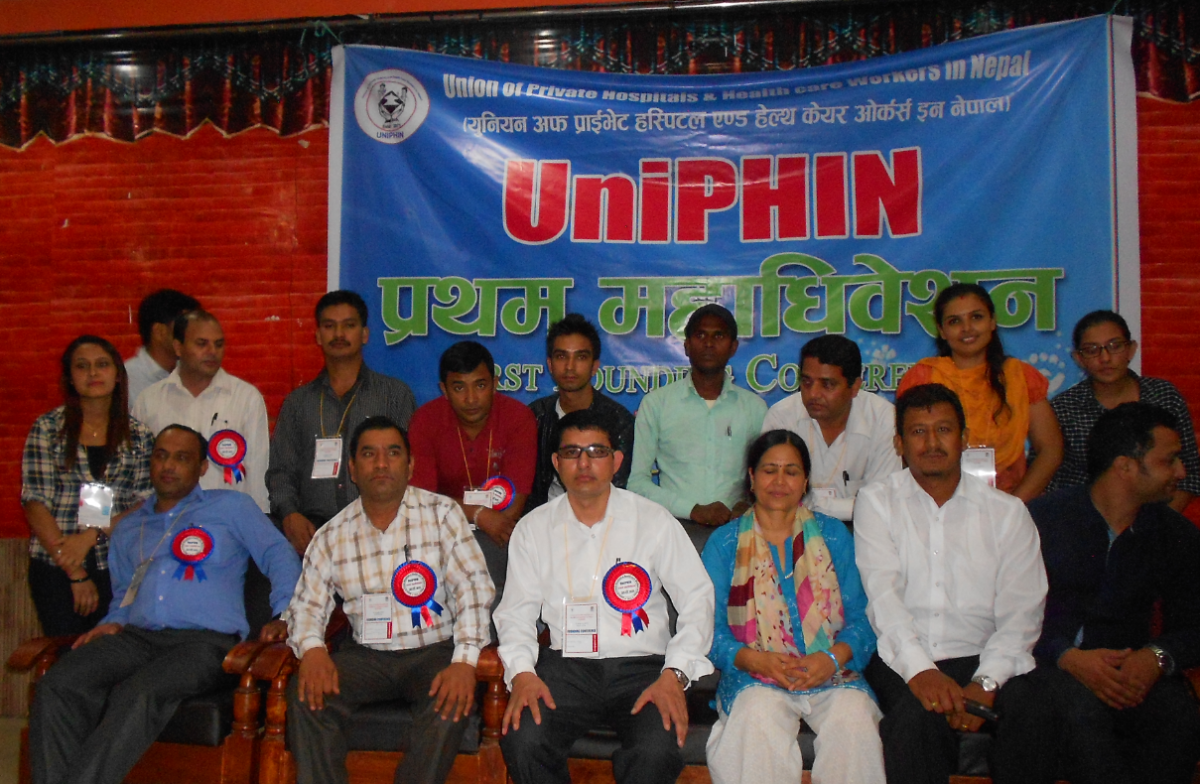Founding conference for 4,000 private hospital workers in Kathmandu

Private hospital workers in Nepal have overcome extremely challenging conditions to hold the founding conference for their new National Health Care Federation: the Union of Private Hospital and Health Care Workers – Nepal (UNIPHIN) in Kathmandu on August 7. The federation brings together 14 unions representing 4,000 workers, and is growing by the day.
At the conference, workers elected their new Executive Committee, re-elected union leader Prithivi Thapaliya as their President, formed an Organising Committee and adopted their new Constitution. This represents huge progress at a time when UNIPHIN members have been working tirelessly to provide healthcare and support for their local communities in the wake of the recent devastating earthquakes which killed more than 8,000 people and displaced thousands more families.
Over the past 18 months, with the support of the UNI Nepal Liaison Council, private hospital workers have battled huge challenges with freedom of association and strong opposition to unions to organise a number of large hospitals and to hold votes to form unions and negotiate collective agreements. As a result, workers came together to form a federation in January 2015.
Now, UNIPHIN has more workers than ever involved, more women in representative positions on their executive committee, and a new plan of action was adopted at the conference. This plan of action will see organising drives and recruitment blitzes taking place more widely than ever before, more workers engaged in collective bargaining, and a stronger than ever push for greater bargaining outcomes. UNIPHIN has a plan to win influence with policy makers for their sector, along with strategies to ensure the voice of workers is heard loud and clear within the hospitals.
This work comes at a critical time as Nepal's private hospital sector expands. The UNI NLC (UNI's Nepalese Liaison Council) has been working closely with UNIPHIN to ensure that workers' power is built at this crucial juncture. UNICARE, UNI's sector for private care, health and social insurance workers, congratulates UNIPHIN on taking these important steps foward and salutes these workers for their dedication to supporting and protecting the health of their communities, and for their drive to organise for a better health care system for everyone - workers and the public - in Nepal.
- Read below for the full story, written by journalist Tansy Hoskins, about how the workers came together to form unions in 14 hospitals.
- Donate to the Nepal Earthquake appeal here, to support UNI NLC's work alongside APHEDA, the Australian Council of Trade Unions Humanitarian Aid Agency. UNI's staff in Nepal continue to work around the clock to provide support to thousands of union members affected by this tragedy. Nepal is one of the world’s poorest countries and living conditions were extremely difficult even before the earthquake. Donating will help UNI and APHEDA use our widespread network of trade unions to provide medical equipment to hospitals as well as shelter, food and water to those in need.


Nepal: private hospital organising takes on insecure work
- by Tansy Hoskins
How to unionise a privatised sector staffed by intimidated temporary workers? A sector rife with firings, discrimination, and even sexual harassment. This was the question facing UNI NLC – the Nepal Liaison Council made up of UNI affiliates.
Nepal’s public health industry is, to use one activist’s word, “dying” and being replaced by private hospitals staffed by temporary health care workers who until 2006 were completely un-unionised. At a training course in Kathmandu, UNI NLC devised a plan for unionising private hospitals. But how to get into these workplaces without arousing suspicion?
A plan was devised for a two month survey on occupational health and safety in the sector – its secret purpose to establish contact with potential trade unionists. “We met many good people,” explains UNI Asia and Pacific’s Rajendra Kumar Acharya. “We met them in coffee shops, asked them to come to our office – management thought it was a survey, but for us it was the start of unionisation.”
One person UNI met was Keshav Chaulagain, a maintenance worker at Om Hospital in Kathmandu. Highly capable, well respected and working in a crucial part of the hospital infrastructure, Keshav would spark unionisation of Nepal’s private health care system. Work began with Keshav reaching out to friends and close colleagues. When a critical mass formed, the workers approached management and demanded the union be recognised or they would strike.
Unionising Om Hospital was a particularly personal quest for Keshav. Nepal had been in the grip of a Maoist insurgency, and in 2004 Keshav was disappeared by the army as a suspected Maoist operative. For months there was no word of him and Om Hospital did nothing to locate him. Six months later when Keshav was released without charge, he returned to the hospital to be told he’d been fired for failing to show up for work. Eventually he was reinstated but his callous mistreatment by his employer drove him to successfully found the Om Hospital Workers Union and to become its Vice President.
News that Om Hospital had successfully unionised spread to the workers at NMC Hospital on the outskirts of Kathmandu. Lab Technician Dinesh Pokhrel (now the President of NMC Hospital Workers Union) was particularly impressed with the unity displayed by workers at Om Hospital. Having been a student and community activist and well versed in Labour Law, Dinesh gathered a group of workers around him.
NMC workers had attempted unionisation before. In an attempt to make them fail again, managers offered Dinesh a big severance package if he would leave NMC – he rejected their offer and with the support of the local community, NMC successfully unionised within three months.
Manju Dotel is a Member Advisor at KMC hospital – the third hospital to gain union recognition. She describes why she and her fellow nursing staff were so badly in need of a trade union: “There were lots of problems working at the hospital – no pay increases, no leave, or nursing facilities. There is still a lot of pressure from managers and seniors on nursing staff. We are not allowed breaks during duty time for food. Shifts used to be 8 hours – now we do 7 hours or night shift is 12 hours.”
Manju plans to stay in the union and wants to progress into a leadership role. She works to support staff who are unfairly accused of making mistakes and being pressured to resign. She wants the hospital to allocate staff training time: “We do not have time for training but we need to develop our knowledge and practise. In the medical field there are new technologies and practises coming all the time.”
It is the case of Kantipur Hospital, the forth hospital to unionise, which perhaps best demonstrates the dangers faced by temporary staff. As well as poor pay and conditions, Kantipur’s female staff faced sexual exploitation and assault.
Whilst in the process of unionising, activists were approached by a woman who said she was being harassed by the hospital’s Director. Another woman came forward, and then another. Activists discovered that the Director had been making temporary staff establish physical relationships with him in exchange for permanent jobs.
Deciding to act, unionists documented numerous examples of sexual harassment, then used a hidden camera to gather evidence of the Director’s crimes. This move to protect female staff created mass support for the fledging union. A mass meeting was called in the hospital, workers declared that they had proof of the Director’s crimes.
When the Director was fired, similar charges arose against the hospital’s Chairman. It took coordinated strikes to also get rid of him – a process that saw six trade unionists fired but later reinstated.
Bikash Adhikari, a health assistant in the Accident and Emergency ward at Kantipur, was central to the founding of the Kantipur Hospital’s Workers Union and is now its President. His ward has a constant influx of road traffic accident and burns victims. “People come there in a critical condition and the relatives of the person expect every support to be provided by the emergency ward staff,” he explains. “Sometimes the main doctors are not on the ward so the emergency staff need to handle cases as a doctor – there is very heavy pressure on emergency staff.”
4,000 private health care employees are now covered by the 14 unions in the UNIPHIN Federation which was recognised by the Nepalese Government in December 2014. Prithivi R. Thapaliya is an ophthalmologist at Om Hospital and President of the Nepal UNIPHIN Federation, he is glad progress has been made, but points to ongoing victimisation and pressure from management.
“The main challenge is temporary contracts,” he says. “Employees are temporary and jobs are not secure. Staff are scared of management and are not involved in union activities.” The unionisation process is central to counteracting this: “First of all we establish the union and when it is established we have a dialogue with the management to make staff permanent” It is on this basis that the plan for the future is to organise in more hospitals and bring even more workers into the Federation to contest the sectors propensity for temporary contracts.

